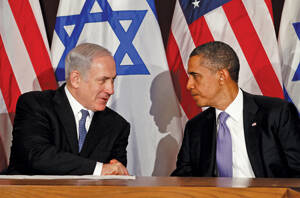What a difference an Election Day makes. After more or less signaling a preference for Mitt Romney in the White House, defying the Obama administration on settlements in the occupied West Bank and repeated efforts to pressure the administration into a more bellicose posture on Iran, Israel’s Prime Minister Benjamin “Bibi” Netanyahu scrambled on the morning of Nov. 7 to deal with a new reality: four more years of Barack Obama.
The Israeli prime minister was among the first to call the president after his victory and quickly pulled together a photo op in the company of U.S. Ambassador Dan Shapiro to publicly congratulate the president. Those gestures were not enough to placate Israeli media or forestall an opportunistic censure from the Israeli Labor Party, apparently seeing an opening before January elections. Critics charge that Prime Minister Netanyahu badly misjudged in his various provocations of the Obama administration and that his bet on the wrong candidate would damage U.S.-Israeli relations.
But can Prime Minister Netanyahu’s sudden enthusiasm for the re-elected U.S. president help revive what has been a faltering Middle East peace process? That’s a definite “maybe,” Philip Wilcox, a retired U.S. diplomat who now serves as president of the Foundation for Middle East Peace in Washington, told America. Wilcox said a “positive sign” is that Netanyahu “believes he now has to take Obama seriously.
“In the past he has treated him almost contemptuously,” Wilcox said, “believing that he controls the U.S. Congress and that he could handle the U.S., and the [Obama] admin would bow to his wishes.”
In Washington some suggest that the president could use his new leverage for political payback as Israeli elections approach on Jan. 22, but Wilcox argues it would be a huge mistake for the administration to become overtly involved in Israeli politics. Despite his apparent misstep in handling the special relationship with the United States, Netanyahu’s right-wing coalition remains strong, says Wilcox, while the Israeli left and center show continuing weakness. The coalition may lose some seats in January, said Wilcox, but Netanyahu is likely to survive.
Happily, his instincts for survival could prove useful. “Netanyahu is something of an ideologue,” he said. “I think he genuinely believes that Israel owns” the occupied West Bank and that it has every right to suppress the nationalist ambitions of the Palestinians who live there. Wilcox added, however, that throughout his career Netanyahu has demonstrated a willingness to compromise when he is under pressure. “He is not a fanatic,” said Wilcox. “I think his principle objective is to remain in power.”
To that end, Netanyahu may accede to renewed pressure to end settlement construction on the West Bank and settler expansion into East Jerusalem as the Obama administration has long advocated. “The U.S. is Israel’s best friend these days—perhaps its only major friend,” said Wilcox. “Israeli voters will be critical of Netanyahu if he is clearly at odds again with the President of the United States. He cannot afford to create a significant breach in this relationship.” And the prime minister will no doubt recall, said Wilcox, that the last time he locked horns with a U.S. president—Bill Clinton in the late 1990s—he was turned out of office at the next opportunity.
Wilcox does not expect to see any rapid response on Middle East policy from the Obama administration. He suspects it will first focus on pulling the United States back from its so-called fiscal cliff, the automatic spending cuts and tax hikes in January that threaten to trigger another recession. After that crisis is presumably resolved, however, Wilcox suggests the Obama administration could put together a domestic coalition including key leadership from the Jewish-American community that could press Netanyahu to halt further settlements on the occupied West Bank and return to the two-state peace process. “It will take courage and persistence,” Wilcox said, but it is a diplomatic feat that could be accomplished if the Obama administration has “the skill and the will.”








